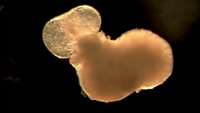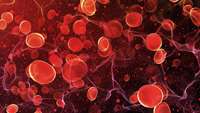Brain organoids developed with complex neural activity
Researchers at the University of California Los Angeles (UCLA; CA, USA) have developed brain organoids that exhibit neurological patterns similar to those found in living human brains.
Lab-Grown Mini-Heart Beats like a 25-Day-Old Human Embryo's Heart
A team of researchers has developed the first human "mini-hearts" in the lab to have clearly beating chambers. The miniature organs, or organoids, are no bigger than sesame seeds and were generated by self-assembly using pluripotent stem cells, according to Science Magazine.
Human cells rejuvenated to a youthful state with transiently expressed proteins
By expressing Yamanaka proteins in human cells, researchers have turned back the biological clock. Researchers from Stanford University (CA, USA) have reverted cells back to a younger state by transiently expressing the well-known Yamanaka factors.
Molecular cocktail converts astrocytes to neurons to restore function
Pennsylvania State University scientists have discovered a combination of four molecules, which modulate four signaling pathways, that converts astrocytes into functional neurons.
A potentially safer, more effective gene therapy vector for blood disorders
Researchers at Children's Hospital of Philadelphia (CHOP) have developed a gene therapy vector for blood disorders like sickle cell disease and beta-thalassemia that is potentially safer and more effective than those currently used in gene therapy trials for those conditions.
Could mesenchymal stromal cells alleviate COPD-related inflammation?
In a new Phase I clinical trial, scientists from the University of Western Australia (Perth, Australia) have demonstrated that a novel mesenchymal stromal cell (MSC) therapy can regulate inflammation in patients with chronic obstructive pulmonary disease (COPD).
Moderna's Experimental HIV Vaccine Could Begin Human Trials as Soon as This Week
Moderna will start trialling its experimental mRNA-based HIV vaccine as early as tomorrow (19 August), according to a new submission to the US National Institutes of Health Clinical Trial registry.
New findings provide hope for treatment of multiple myeloma
Researchers at Karolinska Institutet have investigated the use of low dose venetoclax, an experimental drug, for the treatment of the heterogeneous cancer disease multiple myeloma in patients who had relapsed on standard therapies.











